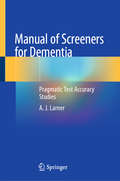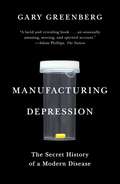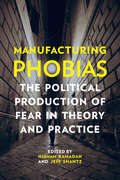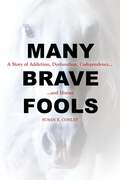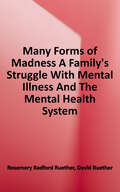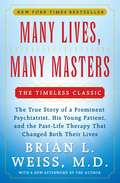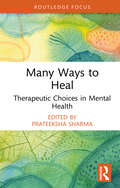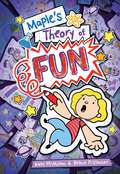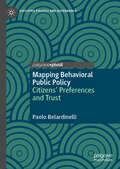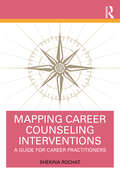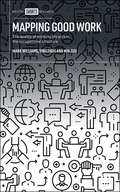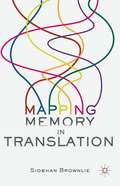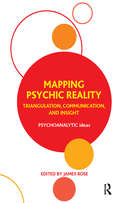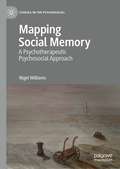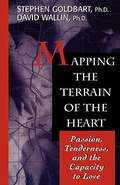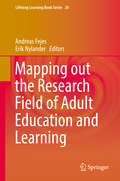- Table View
- List View
Manual of Screeners for Dementia: Pragmatic Test Accuracy Studies
by A. J. LarnerThis book draws on the author’s experience in conducting pragmatic test accuracy studies on screening instruments for dementia/mild cognitive impairment. To facilitate comprehension and assimilation, all data is presented in an easily accessible, succinct and user-friendly way by means of a structured tabular format that allows tests to be easily compared. The pragmatic design of studies ensures high external validity and generalizability for the test results. The book includes a wealth of data on previously presented studies, as well as hitherto unreported test measures (“Number needed” metrics). It presents recently described and new diagnostic metrics (Likelihood to be diagnosed or misdiagnosed; Summary utility index; Number needed for screening utility); data from new studies on screeners (Attended with sign; Free-Cog; Two question depression screener; Jenkins Sleep Questionnaire; Triple test); and previously unpublished data (combination of SMC Likert and MACE; IADL Scale and MMSE). Given its scope, the book will be of interest to all professionals, beginners and seasoned experts alike, whose work involves the assessment of individuals with cognitive (memory) complaints.
Manuale delle Microespressioni: Ci sono delle informazioni che il viso non può nascondere
by Danilo H. GomesLe microespressioni costituiscono un mistero per la stragrande maggioranza delle persone. Attraverso la lettura della gestualità del viso potremmo aiutare molte persone che nascondono la propria tristezza per orgoglio o per paura. Con un buon manuale a disposizione, la lettura dei volti diventa più semplice. MANUALE DELLE MICROESPRESSIONI riassume le microespressioni legate alle 7 emozioni universali di base e 3 reazioni di risposta interne che vengono espresse dal viso umano, accompagnate da immagini dettagliate per una migliore comprensione. Questo libro può essere utilizzato come manuale di base per la lettura delle microespressioni o una guida per approfondire lo studio del linguaggio del corpo. Aguzza la vista e svela i dettagli nascosti!
Manuel des microexpressions: Il y a des informations que le visage ne cache pas
by Danilo H. GomesLe MANUEL DES MICRO-EXPRESSIONS rassemble brièvement les micro expressions de 7 émotions universelles de base et 3 réactions internes exprimées, par conséquent, par le visage humain. Il est accompagné d'images détaillées pour une meilleure compréhension. Ce livre peut être utilisé comme un manuel de lecture de base sur les micro-expressions et un guide pour améliorer l'étude du langage corporel.
Manufacturing Depression: The Secret History of a Modern Disease
by Gary GreenbergGary Greenberg's fascinating argument about the uniquely American pursuit of anti-depression rather than happiness.
Manufacturing Phobias: The Political Production of Fear in Theory and Practice
by Hisham Ramadan Jeff ShantzFear is a powerful emotion and a formidable spur to action, a source of worry and - when it is manipulated - a source of injustice. Manufacturing Phobias demonstrates how economic and political elites mobilize fears of terrorism, crime, migration, invasion, and infection to twist political and social policy and advance their own agendas. The contributors to the collection, experts in criminology, law, sociology, and politics, explain how and why social phobias are created by pundits, politicians, and the media, and how they target the most vulnerable in our society. Emphasizing how social phobias reflect the interests of those with political, economic, and cultural power, this work challenges the idea that society's anxieties are merely expressions of individual psychology. Manufacturing Phobias will be a clarion call for anyone concerned about the disturbing consequences of our culture of fear.
Many Brave Fools
by Susan E. ConleyCodependency, a compulsive behavior sometimes known as &“relationship addiction,&” is often characterized by a dysfunctional, one-sided relationship that is emotionally destructive–even abusive. For years Susan Conley found herself trapped, married to an addict whose health, welfare, and safety she valued far above her own. Over time she watched as she lost contact with her own needs, desires, and sense of self. But then at forty-two, after yet another crisis came to an anticlimactic resolution that left nothing healed and little to hope for, she decided, having never so much as touched a horse, to take up riding. Here, with humor and honesty, Conley chronicles her experiences, sharing how her pledge to rediscover herself following her divorce was aided, abetted, and challenged by the horses in her life. &“They were as large a part of my recovery as were any of the self-help books I read, personal development workshops I did, and 12-step meetings I attended,&” she writes. &“The struggle to heal the wounds of a dysfunctional marriage was actually made easier via the real wounds received from horseback riding.&”Many Brave Foolsexplores the ways in which horses enriched Conley's life, and how the process of making herself into a rider also helped her become the person she most wanted to be: not the &“ex-wife of an addict,&” but a responsive, confident, even courageous woman, entering the prime of her life.
Many Forms of Madness: A Family's Struggle with Mental Illness and the Mental Health System
by Rosemary Radford RuetherIn telling the story of her son's thirty-year struggle with schizophrenia, the author lays bare the inhumane treatment throughout the history of people with mental illness. Despite countless reforms by "idealistic reformers" and an enlightened understanding that mental illness is a physical disease like any other, conditions for people who struggle with mental illness are little improved. She asks why this is so and then goes on to imagine what we would do for people with mental illness "if we really cared."
Many Lives, Many Masters: The True Story of a Prominent Psychiatrist, His Yo
by Brian L. WeissAs featured on Oprah's "Super Soul Sunday," the classic bestseller on a true case of past-life trauma and past-life therapy from author and psychotherapist Dr. Brian Weiss--now featuring a new afterword by the author.As a traditional psychotherapist, Dr. Brian Weiss was astonished and skeptical when one of his patients began recalling past-life traumas that seemed to hold the key to her recurring nightmares and anxiety attacks. His skepticism was eroded, however, when she began to channel messages from the "space between lives," which contained remarkable revelations about Dr. Weiss' family and his dead son. Using past-life therapy, he was able to cure the patient and embark on a new, more meaningful phase of his own career.
Many Lives, Many Masters: The true story of a prominent psychiatrist, his young patient and the past-life therapy that changed both their lives
by Dr. Brian WeissTHE CLASSIC BESTSELLER ON A TRUE CASE OF PAST-LIFE TRAUMA AND PAST-LIFE THERAPY FROM AUTHOR AND PSYCHOTHERAPIST DR BRIAN WEISSPsychiatrist Dr Brian Weiss had been working with Catherine, a young patient, for eighteen months. Catherine was suffering from recurring nightmares and chronic anxiety attacks. When his traditional methods of therapy failed, Dr Weiss turned to hypnosis and was astonished and sceptical when Catherine began recalling past-life traumas which seemed to hold the key to her problems. Dr Weiss's scepticism was eroded when Catherine began to channel messages from 'the space between lives', which contained remarkable revelations about his own life. Acting as a channel for information from highly evolved spirit entities called the Masters, Catherine revealed many secrets of life and death. This fascinating case dramatically altered the lives of Catherine and Dr Weiss, and provides important information on the mysteries of the mind, the continuation of life after death and the influence of our past-life experiences on our present behaviour.
Many Splendored Things: Thinking Sex and Play (Goldsmiths Press Ser.)
by Susanna PaasonenExploring sex—bodily capacities, appetites, orientations, and connections—in terms of play and playfulness.We all know that sex involves a quest for pleasure, that sexual palates vary across people's lifespans, and that playful experimentations play a key role in how people discover their diverse sexual turn-ons and turn-offs. Yet little attention has been paid to thinking through the interconnections of sex and play, sexuality and playfulness. In Many Splendored Things from Goldsmiths Press, Susanna Paasonen considers these interconnections. Paasonen examines the notions of playfulness and play as they shed light on the urgency of sexual pleasures, the engrossing appeal of sex, and the elasticity of sexual desires, and considers their connection to categories of identity. Drawing on a broad range of scholarship on sexuality, play, and the media, Paasonen moves from the conceptual to the concrete, examining advice literature on sexual play, the vernacular aesthetics of the Fifty Shades series, girls' experiences of online sexual role-playing, popular media coverage of age-play, and Jan Soldat's documentary films on BDSM culture.Paasonen argues that play in the realm of sexuality involves experimentation with what bodies can feel and do and what people may imagine themselves as doing, liking, and preferring. Play involves the exploration of different bodily capacities, appetites, orientations, and connections. Occasionally strained, dark, and even hurtful in the forms that it takes and the sensory intensities that it engenders, sex presses against previously perceived and imagined horizons of embodied potentiality. Play pushes sexual identifications into motion.
Many Ways to Heal: Therapeutic Choices in Mental Health
by Prateeksha SharmaThis book creates a scope for achieving mental wellbeing apart from the currently dominant mental health practices, critiqued for their damaging effects on individuals and families. By broadly drawing on salutary possibilities, it brings evidence of existing and emerging approaches to resolve mental distress. The unique volume brings several practices and testimonies together that can support people’s healing and recovery, focusing on the following key interventions: Different ways of looking at emotional suffering beyond psy-knowledge, which many doctors, social workers, disability scholars, legal or policy experts and psy-professionals advocate for The role of expressive arts employed by both professionals and peers Efficacy of peer engagement of a professional nature in India, the newest globally emerging phenomenon, often heralded as the future of mental health worldwide Deftly interwoven with patient and peer narratives in jargon-free language, this one-of-a-kind book brings practices and choices that can facilitate healing and ways out of permanent psychiatric patient-hood. This volume may be of interest to psychiatric and other helping professionals, therapists, researchers, current patients, caregivers, service providers, social workers, non-profits, students of psychology, social work and disability studies, as well as legal and policy experts.
Mapa para educar niños felices
by Susanna IsernEncuentra el camino en la educación de tus hijos con Susanna Isern. ¿Cuántas veces has sentido que no terminas de hallar el camino en la educación de tus hijos? Para nuestros hijos, a menudo somos como un mapa que los guía en sus primeros pasos por la vida y, sin embargo, muchas veces nos desorientamos tanto con su educación que los que acabamos necesitando un mapa somos los padres. ¿Cómo conseguir una comunicación fluida, empática, asertiva y bidireccional? ¿Cómo fomentar que mi hijo se acepte y se quiera? ¿Cómo promover que mi hijo identifique y regule sus emociones y aborde los nuevos retos con positividad? ¿Cómo enfocar la educación de la conducta de mi hijo? ¿Cómo potenciar que mi hijo se sienta feliz hoy y mañana? Con este Mapa para educar niños felices emprenderemos un gran viaje, plano en mano, circulando por los aspectos más importantes de la crianza: la comunicación, la autoestima, la inteligencia emocional, la conducta y los valores, así como por las principales herramientas de las que disponemos para abordarlos. Este libro te ofrece un mapa donde encontrarás las teorías, las experiencias y las reflexiones, los cuentos, las actividades y los casos prácticos necesarios. Todo un periplo impregnado de cariño, respeto y sentido común, para que cada familia encuentre su propio camino y viva la crianza de sus hijos como lo que siempre es, un maravilloso viaje.
Maple's Formula for Victory (Maple)
by Kate McMillan Ruthie PrillamanPerfect for fans of Dork Diaries and Emmie & Friends, this second book in a diary-style illustrated middle grade series follows an anxious, science-minded sixth grader into the high-stakes world of middle school track.Sixth-grader Maple has received absolutely devastating, world-shaking news: her health class fitness test has scored her at a fifth-grade level. That&’s a whole grade level below where she should be. Having all her life been an overachiever—and fitness being an extremely important part of her twenty-year plan to become an astronaut like her hero Jackie Grand—Maple knows she has to fix this ASAP. Maple and Lada decide to join the track team to improve their fitness scores, but they encounter new (and frankly unpleasant) variables like changing in locker rooms and periods. And when it turns out Lada is good at track, and her competitive spirit starts to change her, Maple is sent into a tailspin over her own performance and what it means if she can&’t—literally and figuratively—keep up with her classmates.
Maple's Theory of Fun (Maple)
by Kate McMillan Ruthie PrillamanPerfect for fans of Dork Diaries and Emmie & Friends, this first book in a diary-style illustrated middle grade series follows an anxious, science-minded sixth grader determined to become fun and win back her friend.Sixth grade has been pretty disaster-free for aspiring astronaut Maple McNutt—which is impressive, given the number of worries and possible catastrophes that run through her head every day. (So far, Earth hasn&’t been devoured by a black hole and a cockroach hasn&’t crawled out of her toothpaste mid-squeeze. Phew!) But then her best friend of seven-point-two years, Sunny Gwon, accuses her of being unfun and starts hanging around with a new group of friends. In order to win Sunny back, Maple decides to undergo a serious scientific transformation to become fun by 1. Doing extensive research, 2. Applying research to self, and and 3. Repeating until fun. It&’s risky and groundbreaking research, but Maple has no choice if she wants to save her friendship.
Mapping Behavioral Public Policy: Citizens' Preferences and Trust (Executive Politics and Governance)
by Paolo BelardinelliThis book provides a new perspective on behavioral public policy. The field of behavioral public policy has been dominated by the concept of ‘nudging’ over the last decade. As this book demonstrates, however, ‘nudging’ is one of many behavioral techniques that practitioners and policymakers can utilize in order to achieve their goals. The book discusses the advantages and disadvantages of these alternative techniques, and demonstrates empirically how the impact of ‘nudging’ and ‘non-nudging’ interventions are often dependent on varying political contexts and the degree of trust that citizens have toward policymakers. In doing so, it addresses the important question of how citizens understand and approve of the use of behavioral techniques by governments. The book will appeal to all those interested in public management, public policy, behavioral psychology, and ‘nudging’.
Mapping Career Counseling Interventions: A Guide for Career Practitioners
by Shékina RochatMapping Career Counseling Interventions provides an innovative insight into identifying and resolving problems within career management. In recent years, myriad of counselling tools has been developed so that practitioners can offer the most appropriate support possible. To guide the selection of such tools, this book offers a "map" that introduces and links 63 frequent career management difficulties with more than 160 qualitative interventions and solutions. Through its highly organized layout and extensive detail, major career management difficulties—namely lack of motivation, indecisiveness, dysfunctional beliefs, lack of information, conflicts, and lack of employability—are scrutinized and divided into specific, more manageable sub-difficulties. Targeted interventions to address each of those difficulties, originating from vocational, motivational, and positive psychology, are then suggested and described. From these conclusions, the book delivers practical advice to help conduct these interventions in a sensitive and respectful manner. Overall, this book outlines the most effective ways to foster a good working alliance. One of the book’s standout features is its inclusion of an inventory and card sort to facilitate the identification of obstacles to professional choice and career management. This book is a pivotal resource for the large and diverse community of career development practitioners, such as career counsellors, career advisors, employment counsellors, and career coaches, regardless of their specific audience and work settings.
Mapping Early Modern Japan: Space, Place, and Culture in the Tokugawa Period, 1603 - 1868
by Marcia YonemotoThis history considers a fascinating array of texts, cultural practices, and intellectual processes--including maps and mapmaking, poetry, travel writing, popular fiction, and encyclopedias--to chart the emergence of a new geographical consciousness in early modern Japan.
Mapping Good Work: The Quality of Working Life Across the Occupational Structure
by Mark Williams Ying Zhou Min ZouAvailable Open Access under CC-BY-NC-ND licence In this enlightening study of modern working lives in Britain, leading experts on the sociology of work draw on detailed statistical analyses to assess job quality and job satisfaction. Drawing on decades of research data on hundreds of occupational groups, the authors challenge conventional notions of ‘good work’ and consider them afresh through the lens of workers themselves. With examples from many professions, the book examines why some occupations feel more rewarding than others, regardless of factors like pay and security. Exploring fresh policies to promote the agenda for fulfilling employment, it builds an important case for genuine and sustained satisfaction in working lives.
Mapping Intimacies
by Yvette Taylor Tam SangerThis collection explores sexualities, families, caring practices, and the ways in which people practice intimacy in an ever-changing social and political landscape. Authors map desires, struggles and reconfigurations, thereby broadening current understandings of what contemporary intimate life looks like.
Mapping Memory in Translation
by Siobhan BrownlieThis book presents a map of the application of memory studies concepts to the study of translation. A range of types of memory from personal memory and electronic memory to national and transnational memory are discussed, and links with translation are illustrated by detailed case studies.
Mapping Psychic Reality: Triangulation, Communication, and Insight (The\psychoanalytic Ideas Ser.)
by James RoseThis book is about how we can deepen our understanding of subjectivity through the use of the concept of triangulation. Fundamentally, this book seeks to address the question of how we can be objective about subjectivity. If psychology, as a scientific discipline, is concerned with the study of human experience, which is essentially subjective; then we are faced with the problem of how apply the scientific method, as it is commonly understood. If experience is essentially unique to the experiencer, then there seems to be a basic incompatibility with the scientific method. As currently practised, this method searches for psychic phenomena, which can be validly measured e.g. intelligence; showing a range of individual differences. But this does not enable us to examine individual experience. An individual's experience seems to become impenetrable because generalisation across different individuals' experience entails the loss of individuality in the generalisation
Mapping Social Memory: A Psychotherapeutic Psychosocial Approach (Studies in the Psychosocial)
by Nigel WilliamsThis book is grounded in psychosocial research that explores the complex intergenerational transmission of memories within families and the transgenerational social issues that form a part of those memories. The author demonstrates that the organising framework of moving back and forth between inter- and transgenerational processes is key to mapping those relationships leading to the ideas of generational companionship, a multigenerational self and intergenerational mentalisation. Drawing on sociological and psychoanalytic approaches, it provides a framework for thinking about continuity and discontinuity in the lives of individuals and in the longer sweep of the generations. The role and potential for a psychosocial approach in deep-level problem solving is addressed through chapters on psychotherapy and on psychosocial interventions. Social imagination in personal and social healing is a core theme, as is the study of the relationship between creative and destructive forces that play out in human life. The book will be an invaluable resource for students and scholars of psychosocial research and psychotherapy as well as in memory studies, history, genealogy and social theory.
Mapping The Terrain Of The Heart: Passion, Tenderness, And The Capacity To Love
by David Wallin Stephen GoldbartIf you have read other books about love that have fallen short, read this book. Mapping the Terrain of the Heart is an eloquent guide through love's diverse landscapes that provides a whole new way to think about love relationships. Both descriptive and prescriptive, it is a book for anyone looking to experience a committed relationship full of passion and tenderness. In the labyrinth of love, every one of us has his or her own inner map. Psychologists Goldbart and Wallin lead us along the metaphorical superhighways on the map of love by charting six easily grasped skills―the six capacities of love―that are all necessary to a long-term, stable love relationship: the capacities for erotic involvement, for merging, for idealization, for integration, for "refinding," and for self-transcendence. The authors demonstrate in a very practical, hands-on way how individuals and couples can use these capacities to work on breaking down their usual defenses and grow toward a deeper understanding and connection. In defending ourselves against disappointment in love, we frequently―and often unknowingly―throw up obstacles, create roadblocks, and take detours around these six capacities. We think such detours will take us where we want to go in a relationship, but too often they do not. Goldbart and Wallin's sophisticated but accessible approach―using case studies and practical pointers throughout―based on solid psycho-analytic theory while creating a completely new model for love relationships that also makes intuitive sense. Mapping the Terrain of the Heart offers a comprehensive psychology of love that maps out the paths to a successful relationship and shows how both individuals and couples can progress toward that ever-elusive goal of lasting and passionate love.
Mapping Trauma and Its Wake: Autobiographic Essays by Pioneer Trauma Scholars (Psychosocial Stress Series #Vol. 31)
by Charles R. FigleyMapping Trauma and Its Wake is a compilation of autobiographic essays by seventeen of the field's pioneers, each of whom has been recognized for his or her contributions by the International Society for Traumatic Stress Studies. Each author discusses how he or she first got interested in the field, what each feels are his or her greatest achievements, and where the discipline might - and should - go from here. This impressive collection of essays by internationally-renowned specialists is destined to become a classic of traumatology literature. It is a text that will provide future mental health professionals with a window into the early years of this rapidly expanding field.
Mapping out the Research Field of Adult Education and Learning (Lifelong Learning Book Series #24)
by Andreas Fejes Erik NylanderThis book discusses the current state of the art in research on the education and learning of adults, and how such research has been transformed through contemporary policy and research practices. Gathering contributions from leading experts in the field, the book draws on previous research, as well as new findings in order to provide a map of this research field and its contemporary history. The chapters address a number of questions, including: What constitutes this research field? What theories and methodologies dominate within the field? What “invisible colleges” are active in shaping this academic field, in marking out its contours and in transforming its contemporary battle zones? Who is publishing in the field and who is deemed worth citing? What is the relationship between the shift in state policy on adult education and the research that is conducted on the education and learning of adults? How has the research field changed over time in various western countries? What do these meta-reflections of the field tell us about possible future research endeavours? Rather than speaking from within the field, this is a book about the research field. The diversity of the chapters provide a fascinating resource for anyone interested in research on the education and learning of adults.
